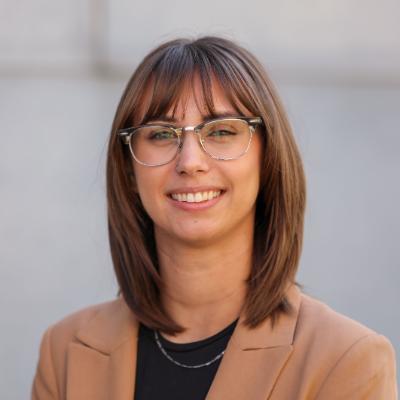
Jordan Velosa ‘25 came to the Juvenile Innocence and Fair Sentencing Clinic (JIFS) with a clear sense of purpose, shaped by her prior experience working on expungement cases before law school. Since joining, she’s gained valuable exposure to post-conviction advocacy while finding a supportive, tight-knit community — further strengthening her drive to pursue justice and systemic change.
What inspired you to join the JIFS, and how has this experience shaped your understanding of the legal system?
Before law school I did expungement work so coming here, I knew I wanted to continue post-conviction criminal defense. I knew that JIFS was the perfect fit for me pretty quickly. Even though we aren’t in trial, I’ve learned about both trial and post-conviction work by looking through trial records and analyzing what went wrong. JIFS exposes us to various forms of post-conviction relief, each highlighting a different way the system can be unfair. All our clients were over sentenced when they were children, which I knew nothing about before joining JIFS. Coming into law school, I knew that the system was generally not good, but now I have a deeper, more nuanced understanding of specific issues and how to fight them.
Can you share some of the practical legal skills you’ve gained while working in the clinic, and how they are preparing you for your future career?
JIFS has improved my writing more than any class I’ve taken. While classes on these topics are valuable, applying the knowledge in real-world settings makes everything click. I’ve written petitions that directly translate to the post-bar positions I’ve applied for. For example, I wrote and filed a felony murder resentencing petition for a JIFS client. During my interview with the Office of the State Public Defender (OSPD), one of the attorneys on the panel had worked on a similar appeal, and I was able to discuss my petition and what I had learned from it.
In JIFS, I have a few cases that are mine — with supervision, of course — and I get to write the motions, access all our clients’ files, talk to clients, and appear in court before real judges. There aren’t really any training wheels, so you learn self-management and time management skills quickly. I recently secured a Barry P. Helft fellowship with OSPD, continuing a tradition as the third consecutive JIFS student to be chosen for this opportunity.
How have your clinic colleagues and the mentorship from professors and staff attorneys in the clinic supported your growth as a law student and future advocate?
On a personal note, the JIFS clinic is a family. I know people say you meet lifelong friends in law school, but I didn’t expect so many of mine to come from this clinic. More to the question, one of the best things about JIFS is the collaborative environment. As a 2L in the clinic, there were always 3Ls around who were willing to help and answer questions, and now I get to pay that forward. Our cases are all different, so when you encounter a new issue, someone else has probably dealt with something similar.
Especially for first generation students, making connections during law school is incredibly important. JIFS has allowed me to form relationships with CJLP faculty and alumni who were able to answer any question I had about different opportunities. I’ve been able to talk to people about application materials, interview expectations, and any general career worries. Even if no one has direct experience with a specific organization, they know someone who does. The mentorship I’ve received through JIFS has played a significant role in shaping me as an advocate. I would 100% recommend JIFS to any student, and I encourage them to talk to people doing the work they're interested in.